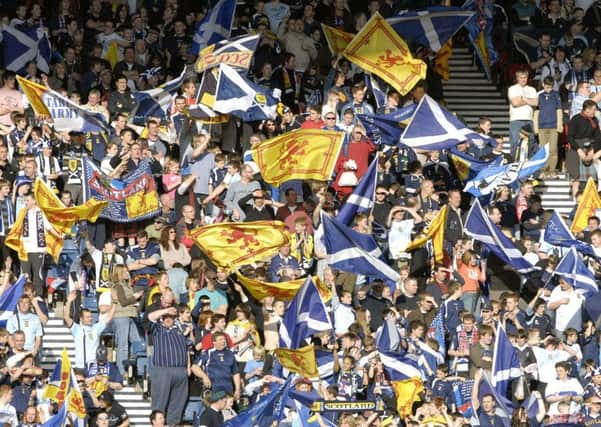The origins of Scotland's most popular football chants


Win, lose, or draw, there’s nothing Scottish football fans love more than a good old sing-song.
In the 1950s, with crowds were bigger than ever before, football songs began to gain cultural prominence, and a flurry of famous comics and balladeers such as Hector Nicol and Glen Daly rushed to take advantage by penning their own. Nicol’s tunes relating to Hearts, Hibs, Dundee United and Dundee, and Glen Daly’s Celtic Song have since become synonymous with the clubs in question. Other popular football songs have even been dreamt up by the supporters themselves.
Advertisement
Hide AdAdvertisement
Hide AdBut where did the melodies come from, and how did they end up on our terraces?


Let’s take a look - and remember to click on the links to hear the originals.
Glory, Glory To The Hibees
Traditionally sung up and down the UK by top English clubs such as Tottenham Hotspur and Manchester United, ‘Glory, Glory’ is also famous up here in Scotland. Celtic fans can be heard singing ‘Glory, Glory’ at most home matches, but Hibernian can claim to being the team to first popularise it thanks to Hector Nicol who recorded a version of the song for the Easter Road club back in the late 1950s. The original tune is based on ‘The Battle Hymn of the Republic’ composed by William Steffe. The famous “glory, glory” chorus was added by Julia Ward Howe in 1861.
Hail, Hail


Another song shared between Celtic, Hibs and a host of other clubs is ‘Hail, Hail’. Celtic’s ‘Hail, Hail the Celts Are Here’ was recorded by Glen Daly in 1961, but the song’s origins go much deeper, as the fans of Belfast Celtic are said to have sang their own version back in the 1920s. Part of the song is derived from the tune ‘Come Friends Who Plough The Sea’, published in 1879 from the Gilbert & Sullivan operetta The Pirates of Penzance, but the most well-known section comes from a military marching song called ‘Hail, Hail the Gang’s All Here’ recorded by Irving Kaufman in 1918.
Stand Free Wherever You May Be
Advertisement
Hide AdAdvertisement
Hide AdSung by Dons fans whether home or away, ‘Stand Free’ is one of Aberdeen FC’s premier anthems. The tune is taken directly from the Lord of the Dance and is used by supporters of Hibernian (We Are Hibernian FC) and St Mirren (We’ll Go Wherever St Mirren Go) among numerous others.
While on the subject of Aberdeen and Hibs, the two clubs share another old tune. The melody from the rather hostile chant beginning ‘We hate Glasgow Rangers...’ is lifted directly from the British patriotic song ‘Land of Hope and Glory’ penned in 1902 by Edward Elgar and A.C. Benson.


Glorious Hearts
Away up in Gorgie at Tynecastle Park, there’s one song you might hear more than any other. Written by Hector Nicol in 1958, ‘The Hearts Song’ is regarded by many fans as one of the best club-specific football songs going.
The rump of the melody is lifted from an old American ballad titled ‘Sweet Betsy from Pike’. Written in 1858, the song details the trials and challenges of a pioneer, Betsy, and her lover Ike who migrate from Pike County in Missouri to California during the Gold Rush. Johnny Cash recorded the song in the 1960s, but Hector Nicol likely heard Burl Ives 1941 rendition. The middle section of the Hearts Song, “this is my story, this is my song”, etc, is thought to have been lifted separately from an old hymn named Blessed Assurance.
Super Well
Advertisement
Hide AdAdvertisement
Hide Ad

Although the melody is not exclusive to Motherwell FC, the football chant, “Well, Well, Super Well”, makes a regular appearance at Fir Park. The tune is from the popular children’s song, ‘Skip to My Lou’, which in turn is derived from an American partner-stealing dance from the 1940s. Hearts fans will remember a version of the song being sung at Easter Road for their player Wayne Foster, who played a pivotal role in knocking Hibs out of the Scottish Cup in 1994.
Follow, Follow
Fans of Rangers FC have a countless list of songs in their canon, but ‘Follow Follow’ has remained a firm favourite throughout the years. The Christian hymn ‘I Will Follow Jesus’, written in 1878 by William Orcutt Cushing, provides the basis of the melody for the Ibrox anthem. Please note: singing the corrupted version of Follow Follow could see you swiftly ejected from the ground.
A female deer?
It’s bemused rival teams for two decades, but the reason why Tartan Army supporters sing ‘Doe a Deer’ has a rather interesting back story.
The song, which originates from The Sound of Music, was first aired by fans during a France 98 qualifier when Scotland lined up for an away tie against Austria. Rumour has it that the Austrian press said fans would hear “the sound of music tonight” at Vienna’s Ernst Happel Stadion due to the Tartan Army’s presence. Keen not to disappoint, the Scottish fans duly responded with a slice of Julie Andrews.


You’re Not Singing Any More/Sing When You’re Winning
Advertisement
Hide AdAdvertisement
Hide AdUsed primarily to wind up the opposition, “You’re Not Singing Any More” has been twisted in all manner of ways since its introduction to British football. The main melody is derived from an old Welsh hymn tune, Cwm Rhondda, which was later translated into the English versions, Bread of Heaven and Guide Me O Thou Great Redeemer. The same melody was also used in the terrace song “We’ll Support You Ever More”, most commonly heard when your team has just been gubbed or relegated.
‘Sing When You’re Winning’, the other side of the coin from ‘You’re Not Singing Any More’, is taken from Guantanamera, a hugely popular tune among Cubans made famous in the 1960s by The Sandpipers and Pete Seeger. A “Guantanamera” translates as an “old peasant woman from Guantanamo”.
The tune to Guantanamera was used to its best effect in 2007 when the Tartan Army fans threatened to “deep fry” the pizzas of their Italian counterparts. Genius.
We Shall Not Be Moved
We Shall Not Be Moved is taken from an African American spiritual song entitled “I Shall Not Be Moved”. First recorded in 1929, it gained fame during the Civil Rights Movement as a protest song, but was actually a cry of confirmation in one’s belief in God. Celtic fans, meanwhile, adopted the tune in the post-war era as a cry of defiance against “the Hearts, the Hibs” and “the Rangers”. A rousing rendition of the song was sung at Lisbon’s Estádio Nacional as fans celebrated the team winning the European Cup in 1967.
Here We Go
Advertisement
Hide AdAdvertisement
Hide AdThe melody for the popular fitba’ ditty ‘Here We Go’ is well-worn among Aberdeen fans and those urging their club’s board to consider their career options. It originates from the American marching song, The Stars and Stripes Forever, penned in 1896.
He Scores When He Wants, etc
It’s difficult to pin down a defining name for this melody - it’s been used so often and in so many different ways. It originates, however, from an old Bahamian folk song from Nassau first published in 1916. Known as “The John B. Sails” among many other titles, the song was later popularised by The Beach Boys when the surf quintet released it as “The Sloop John B” in 1965.
She’ll Be Coming Round The Mountain
Dating from the 19th century, the old folk song ‘She’ll Be Coming Round The Mountain’ is ubiquitous among football supporters of all clubs and is used in lots of different ways. Partick Thistle’s ‘If You Want to go to Heaven’ wins top marks for inventiveness, however.
Killie Till I Die
Kilmarnock’s paean to eternal loyalty ‘Killie till I die’ is from the children’s nursery rhyme ‘I’m H-A-P-P-Y’. The tune is more common among clubs south of the border.
Saints and winners
Advertisement
Hide AdAdvertisement
Hide AdThe old gospel song ‘When the Saints Go Marching In’, is used by numerous Scottish clubs including, St Johnstone, St Mirren, Dundee United (substituting ‘Saints’ for ‘shed’, the club’s most famous stand), Hearts (swapping Saints for Hearts), and Aberdeen (swapping Saints for Reds).
Top of the Pops
Some of Scottish football’s most famous club anthems have been lifted directly from popular tunes of the past 60 years.
When Marie Osmond released her 1970s hit Paper Roses, it’s safe to assume she never envisaged it being belted out by burly men on the concrete terraces of East Ayrshire. 40 years on, though, the song has become an established anthem for Kilmarnock FC, and in 2013 Marie honoured the link by singing her hit song live to the club’s supporters.
Then there’s You’ll Never Walk Alone, made famous in 1945 in the Rodgers and Hammerstein musical Carousel, and now sung by Celtic FC on matchdays. The football connection was started in Liverpool in the 1960s thanks to Gerry and the Pacemakers, gaining popularity from there.
Advertisement
Hide AdAdvertisement
Hide AdThe East Coast equivalent to YNWA is undoubtedly The Proclaimers song Sunshine On Leith, adopted by Hibs fans from the day it was first released in 1988.
Other pop songs which have made it on to the terraces in various creative guises include, The Beatles’ Yellow Submarine, Middle of the Road’s Chirpy Chirpy Cheep Cheep, Chicory Tip’s Son Of My Father, The Monkees’ Daydream Believer, Felix Bernard’s Walking In A Winter Wonderland and Scott Joplin’s 1902 ragtime The Entertainer.